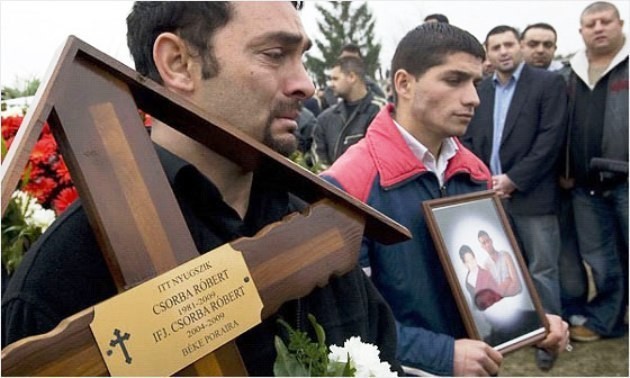Hungary: NGOs call for a memorial-day for Romani victims of neo-Nazi terror
21 February 2024

Roma NGOs have organised a vigil in Budapest for the 23 February, to mark the 15th anniversary of the murder of five-year-old Robika Csorba and his father Robert, victims of a murderous series of attacks on Roma settlements across Hungary in 2008 and 2009. Six Roma were slain and over 50 others wounded in the wave of far-right terror, which left the maimed and the bereaved severely traumatized.
As reported by Mérce.hu, on this 15th anniversary, the Roma Press Centre and more than forty non-governmental organizations have petitioned Parliament to declare 23 February a memorial day for the Roma victims of neo-Nazi terrorism, to ensure that theses atrocities are not erased from public memory:
"Hungary's most serious terrorist act after the Second World War has been forgotten after 15 years. As if it never happened. The vast majority of 15-year-old children today have no idea that at the time of their birth, hundreds of thousands lived in fear, because no one could know who would be the next victim.”
The wave of racist terror
After midnight on 23 February 2009, in the village of Tatárszentgyörgy, attackers first threw Molotov cocktails, setting the Csorba family home ablaze. On hearing the bangs, Robert grabbed his two eldest children, while his partner took the youngest child Maté. As Robert fled the burning house, holding Robika close to his chest and Bianka by his side, a waiting gunman opened fire hitting all three. Only Bianka would survive.
This appalling murder occurred against a backdrop of rising anti-Roma intimidation, racist rallies by paramilitary groups, and calls for a final solution by the likes of Zsolt Bayer, the far-right publicist and close friend of Viktor Orbán. Bayer – who had infamously written that “a huge number of Gypsies have given up on coexistence and given up on their humanity” – declared “One must retaliate rather than tolerate. These animals shouldn’t be allowed to exist. In no way. That needs to be solved — immediately and regardless of the method.”
The police proved to be both racist and incompetent in their investigation, they refused to recognise and failed to investigate the possibility that the attacks were linked and racially motivated. Only after the May 2009 assassination of Jenő Kóka, gunned down as he left home for his nightshift in a local factory in Tiszalök, did the police conceded that the atrocities were likely linked and carried out by a four-man cell with military expertise.
However, they failed to apprehend the killers and to prevent the final assault in August 2009, when gunmen smashed their way into the home of Maria Balogh in the village of Kisléta, murdered her in her bed, and seriously wounded her 13-year-old daughter Ketrin. On 21 August 2009, police arrested four perpetrators. What was especially chilling at the time was the lack of public sympathy and solidarity with the Romani victims and community.
Never forget
For Hungary to overcome racism there must be an end to writing Roma out of history, an end to the relegation of their contribution to Hungary’s history and culture to the footnotes, and an end to the negation of their experience of oppression. Too often, official histories and public discourse have reduced the experience of the Roma to a matter of little consequence in the story of the nation.
When it comes to such recent events as the serial murders of Roma, it is vital to ensure that what occurred in 2008-2009 is officially commemorated, never elided in the public memory, and that the trauma of lethal racism is fully understood. As the petition states:
“We need to understand what led to a terrorist group being able to launch attacks almost every month for over a year without being caught! We have to face the social conditions that gave birth to a series of crimes that divide Hungarians based on skin color! We have to process the traumas caused by the attacks and terror, which are still hidden under the cloak of silence! We must remember and remind, so that today's 15-year-olds do not make the mistakes that we, their predecessors, made!"
This message is especially urgent, for 15 years after the killing of five-year-old Robika, anti-Roma racism has been ‘mainstreamed’, for it is no longer the preserve of nazi sociopaths. Political leaders across Europe regularly resort to hate speech against Roma for electoral traction.
It should be cause for alarm that the Roma, singled out for extermination by the Nazis and their fascist allies just eighty years ago, can be targeted publicly by far-right forces across Europe in the 21st Century; stigmatised and singled out for collective punishment by mainstream politicians and neo-Nazi movements alike, while ethnic majority populations remain publicly indifferent and ambivalent.
The murderous wave of violence that was visited upon Roma in Hungary just fifteen years ago, was a shock reminder that it’s not enough to be non-racist and say ‘never again’, citizens must be actively anti-racist. Political leaders who indulge in anti-Roma rhetoric for short term electoral gain, who fail to condemn or even tacitly condone acts of violence against Roma, stand accused. Not only do such politicians dishonour the dead, but by virtue of their collusion, they imperil the living, for to be silent is to be complicit.
Back in 2012, the Council of Europe’s commissioner for human rights, Thomas Hammarberg, called for the establishment of a Europe-wide truth commission to increase public awareness about the past mass atrocities against the Roma as key to combating antigypsyism in the present. He stated that “a full account and recognition of the crimes committed against the Roma might go some way to restoring the trust of Roma communities in society.” Public ‘forgetfulness’ about the racist murders of Roma in 2009, and the persistence of anti-Roma racism in Hungary, should serve as a warning that the need for such a reckoning with history remains more urgent than ever.




